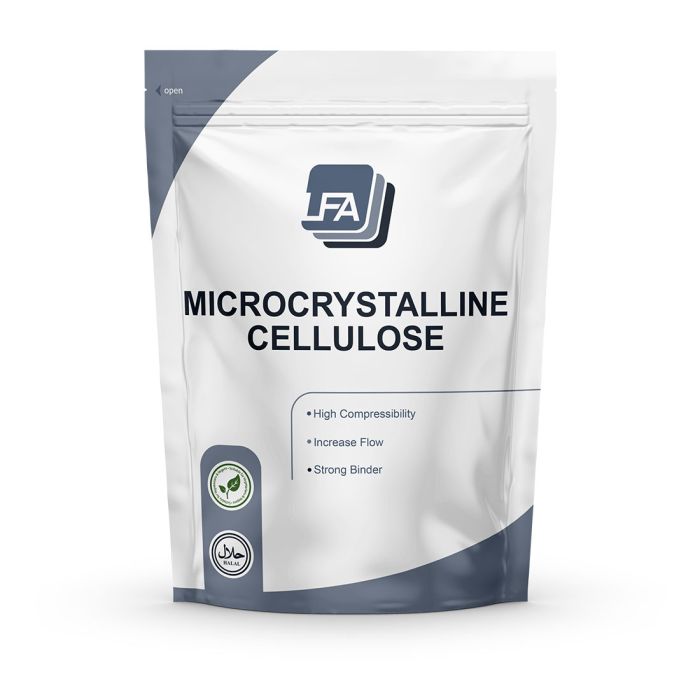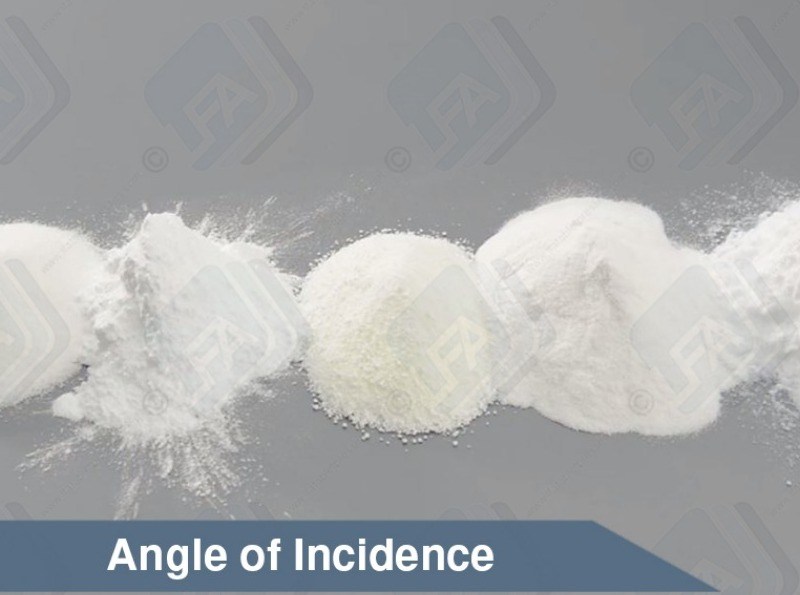Cellulosa Microcristallina
Quale è l'eccipiente ideale? E' quello che facilita l'ingerimento ai clienti e semplifica il processo di produzione dei produttori. Non deve essere soltanto l'eccipiente consentito da utilizzare, ma che vada oltre le normali funzionalità. La cellulosa microcristallina potrebbe essere l'agente legante che stavate cercando. Non agisce come carbossimetilcellulosa e se confrontata con altri agenti leganti, sembra fornire un ottimale grado di fragilità nonostante resti un ottimo lubrificante.
Principali vantaggi della cellulosa microcristallina
-
Elevata comprimibilità
-
Aumento della fluidità
-
Forte legante
-
Inodore, insapore
-
Non reattivo
-
Basso assorbimento
La cellulosa microcristallina, normalmente nota come MCC, è prodotta in ambienti controllati. Il risultato finale è una polvere bianca pura, inodore ed insapore, in grado di fornire durezza per le vostre compresse. MCC mantiene gli stessi vantaggi di un diluente. E' efficace come agente veicolante per le vostre compresse, donandole il peso esatto per i vostri clienti. La cellulosa microcristallina ha una densità minima di massa e migliora le caratteristiche di fluidità. La sua scorrevolezza assicura una buona miscelazione di tutti gli ingredienti. Se la miscela è consistente, ogni compressa avrà la stessa quantità di ingrediente al termine della produzione, creando compressi di ottima qualità.
Perché scegliere la cellulosa microcristallina
La cellulosa microcristallina svolge perfettamente il suo lavoro. Funziona bene anche con molti altri eccipienti famosi ed è parte integrante delle formule di molti produttori. I leganti rappresentano un elemento essenziale nel processo di creazione delle compresse, perché assicurano "durezza" alle stesse. Inoltre, la compressibilità influenza ogni aspetto del prodotto finale, ad esempio, la disintegrazione, la dissoluzione e l'assorbimento. MCC può essere compresso direttamente e può essere compresso in capsula senza passare attraverso un processo di miscelazione o granulare, rendendo l'intero processo più efficace.
Compressibilità e legante sono caratteristiche indiscutibili della cellulosa microcristallina. Nessuna di queste caratteristiche ne scoraggiano la dissoluzione semplice in forma di compressa, un elemento essenziale per capsule e compresse. MCC è sicuro da consumare in quantità normali, e largamente utilizzato come eccipiente per la compressione di capsule. Inoltre, si tratta di una risorsa naturale di fibra alimentare e non è calorico. Oltre tutto, MCC è inerte, il che significa che non reagisce o interferisce con le altre sostanze.
Il verdetto di LFA
In definitiva, questo prodotto potrebbe essere proprio ciò che stavate cercando. E' molto popolare grazie alle sue incredibili qualità diluenti e leganti, e preserva per voi queste proprietà. Il vostro processo di formulazione diverrà più semplice utilizzando questo ingrediente. Grazie ai suoi vantaggi, la cellulosa microcristallina è la scelta ideale come agente legante. Utilizzando l'MCC con altri eccipienti, rende la produzione più efficace e senza intoppi.
|
Nome |
Valore |
|---|---|
|
Numero CAS |
9004-34-6 |
|
Formula molecolare |
(C6H10O5)n |
|
Aspetto |
Sottile polvere bianca |
|
Stato fisico |
Solido |
|
Conservazione |
Conservare a temperatura ambiente |
|
Punto di fusione |
260–270 °C; 500–518 °F; |
|
Densità |
1.5 g/cm3 |
|
Solubile in acqua |
No |
|
Documenti |
Offriamo Cellulosa Microcristallina, Stearato di Magnesio, Fosfato Dicalcico e Firmapress nella nostra gamma di eccipienti.
Cellulosa microcristallina, un legante, che detiene il contenuto del tablet insieme.
Il Fosfato dicalcico è un fluire di agente e aiuta a spostare ingredienti attraverso la macchina prima sono compressi.
Stearato di magnesio è un lubrificante secco e aiuta di nuovo con il movimento degli ingredienti attraverso la macchina, ma aiuta anche con l'espulsione di compresse dalla macchina. Siete pregati di notare che il Magnesio Stearato non associa se stesso.
Firmapress è un tutto in un mix di Cellulosa Microcristallina, Stearato di Magnesio e Fosfato di calcio.
È improbabile che si sarà in grado di produrre tablet senza l'utilizzo di uno qualsiasi degli Eccipienti. Alcuni prodotti si legano senza Eccipienti, ma poi non passano attraverso la macchina. Si consiglia di utilizzare un
Sì, tutti i nostri Eccipienti sono estratti da fonti naturali. Per ulteriori informazioni, si prega di visitare la pagina di ciascun prodotto.
here are 6 steps that should be followed as a general rule of thumb when cleaning contact surfaces that have come into contact with powders:
Dry Clean - First you need to remove as much of the dry powder as possible. You can do this using a hover/vacuum. Make sure that the vacuum you are using has a filter good enough to handle fine dust.
Wet Clean - Next you need to perform a wet clean. This can be done with warm water and soap or if available an ultrasonic cleaner.
Rinse - Next you need to rinse off any soap with potable water (drinking water). You do not have to do this if you used an ultrasonic cleaner in the last step. It is important to ensure that all parts are thoroughly dried immediately after washing to avoid any rusting.
Sanitise - Next you need to sanitise the surface. This step is recommended by the FDA. There are a number of sanitising solutions available designed to be applied and left on.
Lubricate - You now need to lubricate any parts that require it. This should be with the appropriate grade oil or grease considering your use and greasing chart. Store - Finally store any of the parts in a cool dry place. If you are storing them on the machine then make sure the machine is in a temperature controlled environment with low humidity.
Firmapress - 2 years form batch date.
Dextrose - 3 years from batch date.
Dicalcium Phosphate - 3 years from batch date.
Microcrystalline Cellulose -
Magnesium stearate -
Lactose - 2 years from batch date.
Silica Dioxide - 2 years from batch date.
Firmapress - 2 years form batch date.
Dextrose - 3 years from batch date.
Dicalcium Phosphate - 3 years from batch date.
Microcrystalline Cellulose -
Magnesium stearate -
Lactose - 2 years from batch date.
Silica Dioxide - 2 years from batch date.
Dextrose - approx 100 mesh
Dicalcium Phosphate - approx 100 mesh
Microcrystoline Cellulose - approx 120-200
Magnesium sterate -
Lactose - 80 mesh
Silica Dioxide -
Firmapress - 100-200 mesh
Yes, all of the excipients are safe for human or animal consumption. There are some precautions that should be taken when handling them and there are some people that might have intolerances to some of them. Information on this can be found in the products MSDS and Intolerance Data Sheet. This can be found in this section for every excipient.
Yes, it does not matter what age, size or sex the person consuming the products is. It is, however, important to check the intolerance data.
Yes. CoA stands for Certificate of Analysis this is also known some times as an MSDS (Material Safety Data Sheet) all of the information contained in a CoA is inside the MSDS for every LFA product which is emailed to you after purchase.
Dextrose - Sweetener, binding agent, good for chewable tablets or candy.
Microcrystalline Cellulose - Binder, filling agent. Good at binding tablets and making them bigger. It can also be used as a filler for capsules.
Magnesium stearate - Dry Lubricant. This stops products from getting stuck to the tooling. It can also help with powder flow issues and caking issues.
Lactose - Binder, sweetener and bulking agent. It has a large mesh so it flows well but most people do not like it because of the intolerance issues.
Silica Dioxide - Flowing agent. This assist powders in flowing smoothly through the machines. It also helps with cacking issues where powders get stuck to the machine.
If your product or API is clumpy then you will need to add an anticaking agent. For this, we recommend silicon dioxide. We only recommend adding a maximum of 2% of this to the mix
If your product is sticky then you will need to add a dry lubricant to your mix. For this, we recommend magnesium stearate.
We do not recommend that you add more than 1% to the mix as more than this can cause capping. If your product is still sticky at this point then we would recommend looking into granulation.
If your product does not bind well then we would recommend using MCC. This can be used in any % the limiting factor is the size of the tablet.
If the amount of MCC you would have to use would be too much or if you do not want to use MCC then you have 3 other options: Ask your supplier for a directly compressible or tabletable grade of your product. Spray dry your product. Wet granulate your product.
Yes. There are two things at play here. You can get hygroscopic and hydrophobic excipients. Hygroscopic means that they take on water quickly, while hydrophobic means that they repel water.
There are products know as supper disintegrants. These products help the breakdown of tablets. At the moment LFA does not sell any supper disintegrants.
Magnesium stearate is hydrophobic this means that it will slow the breakdown of a tablet.
However, it is used in such small amounts that most of the time it will not make a difference to our customer's products. If they would like to be sure then they should conduct what is known as a disintegration test.
Yes, there are all of them can be found in the intolerance sheets for each product. The intolerance sheets can be found here: https://www.lfatabletpresses.com/product-data
FFFFFF 









